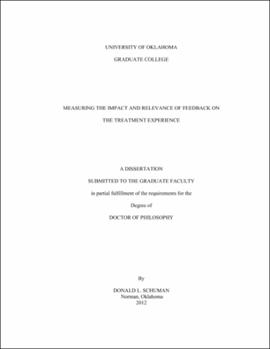| dc.contributor.advisor | Damphousse, Kelly | |
| dc.creator | Schuman, Donald L. | |
| dc.date.accessioned | 2019-04-27T21:34:50Z | |
| dc.date.available | 2019-04-27T21:34:50Z | |
| dc.date.issued | 2012 | |
| dc.identifier | 99311277802042 | |
| dc.identifier.uri | https://hdl.handle.net/11244/319067 | |
| dc.description.abstract | Despite decades of research, the key components of effective psychotherapy continue to be debated. Evidence-based practice has gained prominence and there is increasing demand from managed care and other payees that specific behavioral health problems be treated with psychotherapy interventions or techniques whose efficacy is supported by research. However, research conducted over the past decade suggests that no one counseling model or intervention reliably produces superior results and that there exists common or contextual features of all counseling that are most predictive of therapeutic outcome. This study explored whether routinely administered limited participant feedback provided to therapists at an Army Substance Abuse Outpatient Treatment Program improved treatment outcomes for participants who provided feedback on their functioning at weekly intervals using the 4-item Outcome Rating Scale (ORS). Subjects were 300 active-duty male and female soldiers randomized into a feedback group (N = 150) and a control group (N = 150). Eighteen Department of the Army civilian therapists participated by providing group psychotherapy to the participants. | |
| dc.description.abstract | The study design intentionally did not proscribe therapists' behavior; the only change in the regular treatment process was therapists' knowledge of weekly progress graphs derived from ORS results for participants in the feedback condition. As predicted, participants whose therapists received weekly feedback showed both better treatment attendance and treatment outcomes than did participants where feedback was not provided to therapists. The results suggest that instead of limiting measurement of treatment outcome to the end of treatment (traditional efficacy studies), therapists' access to systematic feedback from the client's perspective of the treatment experience throughout the treatment experience can have a significant positive influence on the course of treatment itself. Results further emphasize the need for additional outcome-based research. | |
| dc.format.extent | 98 pages | |
| dc.format.medium | application.pdf | |
| dc.language | en_US | |
| dc.relation.requires | Adobe Acrobat Reader | |
| dc.subject | Psychotherapy--Evaluation | |
| dc.subject | Mental illness--Treatment--Evaluation | |
| dc.title | MEASURING THE IMPACT AND RELEVANCE OF FEEDBACK ON THE TREATMENT EXPERIENCE | |
| dc.type | text | |
| dc.type | document | |
| dc.thesis.degree | Ph.D. | |
| ou.group | Graduate College | |
